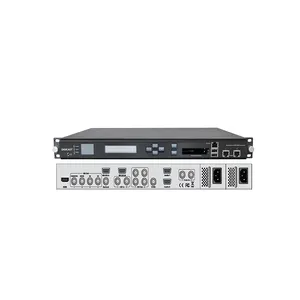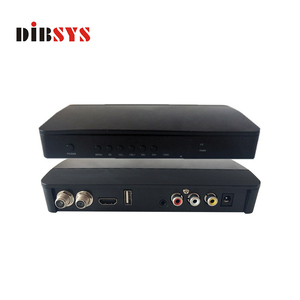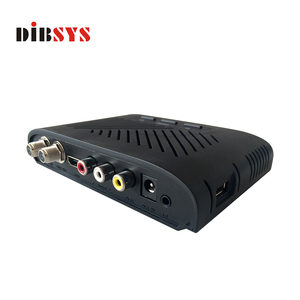Types of Decoder for Encrypted Channel
A decoder for encrypted channel uses a specific technology to decode and decrypt information transmitted in a digital format. This system helps to secure and keep information private so that only those with the decoder can get to it. There are different decoder types depending on the specific application, such as consumer electronics, telecommunications, or cybersecurity.
The following are common types of decoders for encrypted channels:
- Digital TV decoders: These decoders change encrypted digital signals to display them in a viewable form on televisions. They are commonly used in cable and satellite TV services to decode and decrypt signals carrying encrypted information and ensure viewers get various channels and content.
- Streaming media device: Streaming has become the main way people access entertainment. These devices allow users to access various encrypted streaming services directly to their TVs or other media. They utilize advanced decoding technology to ensure that users can view encrypted content without buffering or other technical issues.
- ID and access control decoder: This decoder plays a crucial role in determining access control and personal identification in various industries. It efficiently decodes encrypted information in ID cards, access badges, and biometric data to authenticate individuals and regulate access to secure areas.
- Pay-per-view decoder: This decoder is essential in the entertainment industry for services like pay-per-view events in sports. It accurately decodes encrypted signals for individual event purchases, ensuring that subscribers only pay for what they intend to view.
- Encrypted communication decoder: These decoders use encryption to secure data transmission between two or more individuals. They are mostly used in military operations, where the transmission of sensitive data needs to be secured. They include features like scrambling techniques to keep the communication system safe from hackers.
- ION Decoders: These decoders help improve the overall viewer experience by efficiently decoding digital signals and implementing features like electronic program guide functionality.
Functions and Features of Decoder for Encrypted Channels
Different types of encrypted channels are available, but the most popular are satellite and cable channels. Decode the encryption using proper technology and tools to watch the channels. These are some of the important features that decoder for encrypted channels have:
- Signal Processing: The processing of signals is smooth and fast. Usually, the signals are captured from either the satellite or cable transmission. The signal is decrypted, then converted into audio and video formats before it is sent to the TV.
- Electronic Program Guide (EPG): This is an important feature of an encrypted decoder. It helps viewers know when shows will come on different television channels. The guide is interactive, so viewers can scroll, find programs they want to watch, and set times for the programs they want to watch later.
- Parental Control: These decoders have these controls so that parents can restrict some channels or programs that are not suitable for children. The controls help to create a safe environment for every viewer.
- Mosaic Channel Preview: This feature helps to show a preview in a small picture of what is happening in different channels within a grid. It will be easier for viewers to choose which channel they want to watch without scrolling for a long time.
- Multi-Lingual and Multi-Regional support: This allows the decoder to be used in different languages and in various regions. Viewers can choose their preferred language from a long list of options. Offering multilingual support makes the encrypting decoder accessible so that many people can use it.
- Input Sources: Users can switch between different audio and video input sources, such as HDMI, AV, or Component Input. These allow connections to VCRs, gaming consoles, and cameras, among others, to provide entertainment and content aside from broadcast channels.
Scenarios
Decoders have numerous applications:
- Security Systems: Encrypted channels safeguard vital video observations in security frameworks, where decoder tools change delicate CCTV film for insurance against unapproved access. This helps keep public wellbeing solid and see how goods move through ports, air terminals, and fringe intersections.
- Automotive Industry: The car business utilizes decoder for encrypted channel to safeguard programming records connected with key motor control units, helping adaptations, reviews, and supported administration consciousness of vehicles' exhibition and disallowing inconsiderate hacking endeavors that upset driving quality and wellbeing. Furthermore, contemporary vehicles furnished with infotainment frameworks and mimicked dashboard assemblies depend upon decoded computerized flags from channels like DAB and satellite radio to give numerous premium entertainment collections. Flags getting through such channels get sent via computerized media after being deciphered, permitting travelers to encounter relentless audio. Simultaneously, satellite-connected game plans with following capacities contract flag from worldwide situating organizations, which dials in vivid route after identification through encryption.
- Broadcasting Applications: Decoders convert squeezed advanced transmissions for communicating, streaming, and recorded media playback. Their motivation, in this case, is to transform advanced squeezed sign into an organization that can be sent over radio or telecom lines, accordingly making related decipherting hardware and early reception indispensable parts of a communicated or streaming endpoint, including a decoder for ongoing media playback and deciphering advanced squeezed signals before transmission.
How to Choose a Decoder for Encrypted Channel
Choosing a decoder for encrypted channels requires careful consideration of various factors to ensure it meets specific needs and preferences.
- Decoding Standard: Different decoders use various decoding methods, so find out the one that suits the interests. For instance, when trying to decode the digital video broadcasting to satellite televisions (DVB-S2), video encoding such as Advanced Video Coding (H.264/AAC) must be ensured.
- Channel Lineup: An accurate channel lineup is crucial since every interests differ. Therefore, before buying, ensure the decoder's sample channel includes all target content.
- Additional Features: Additional features, such as video streaming apps integrated into the decoder, digital rights management (DRM) system, dual band Wi-Fi, compatibility with various television resolutions, and the ability to decode multiple signals simultaneously, play a significant role in decision-making.
- Compatibility: Ensure the decoder aligns with the existing setup. For instance, when trying to decode the digital audio broadcast system (DAB), ensure the available bandwidth system matches the DAB decoder. Moreover, ensure compatibility with available TVs, audio equipment, and other devices.
- Reviews and Recommendations: Reviews and recommendations from trustworthy sources should be consulted for insights on decoder performance, reliability, and customer support. An analysis of the previous buyer's feedback can help make an informed choice.
- Satellite Coverage: Ensure the decoder is compatible with the local satellites, which heavily depend on the geographical region as it determines the signal reach.
- Budget: Weigh the decoder's price against its value. Adhere to the financial plan and settle on a fair compromise between cost and included capabilities.
FAQ
Q1: What is the decoder for encrypted channels?
A1: A decoder for encrypted channels is a device that decodes encrypted signals, allowing access to previously restricted TV channels.
Q2: CanFraudsters cannot easily access encrypted channels using decoders?
A2: No, accessing encrypted channels using decoders is regulated by law and encryption technology safeguards that prevent unauthorized access.
Q3: Are there different types of decoders for encrypted channels?
A3: Yes, there are many kinds of decoders for encrypted channels, and their features and specifications differ based on the encryption technology and the intended use.
Q4: Can I use a decoder to record programs from encrypted channels?
A4: It depends on the device's features; not all channel decryptor boxes have recording capabilities.





































































































































































